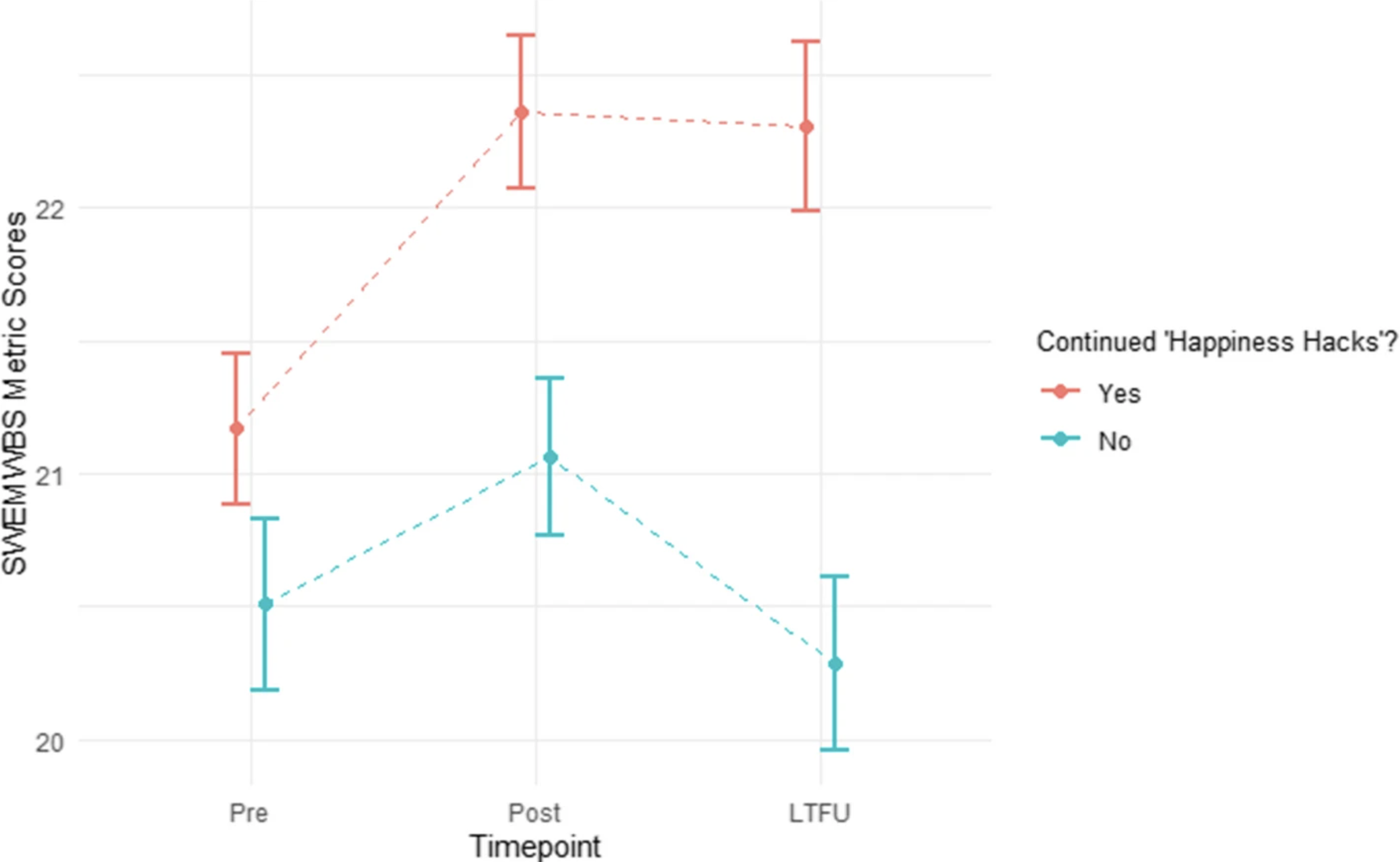
A new study finds that a “Science of Happiness” university course, designed to teach students a variety of happiness hacks, provides the most long-term benefits when participants stick with the tools and exercises after completion.
There have been many experiments showing the short-term benefits of positive psychological interventions like gratitude, meditation, kindness, and journaling, but not many studies have looked into these effects on a longer timeline.
At the University of Bristol, there’s a popular course known as “The Science of Happiness” that aims to teach students how to use various happiness hacks to improve their mental health and well-being. This course has been running since 2019 and has been offered both online and in-person.
The program balances practical advice with important information on topics such as: the nature of happiness, the role of biology and environment, cognitive biases, brain mechanisms, problem-solving, and the importance of social connection. At the end of each week, students are instructed to try evidence-based activities or “happiness hacks,” as a way of fostering positive mental well-being.
In previous years, individuals who took the course reported significantly increased mental well-being from the first week to the final week, as shown by a 10-15% increase in their scores on the Short Warwick-Edinburgh Mental Well-Being Scale. Participants also reported reduced loneliness and anxiety. A follow-up after six weeks continued to show sustained benefits, but it was unclear how long these positive effects lasted.
In a new study published in the journal Higher Education, researchers analyzed 228 undergraduate students from various disciplines who had completed the positive psychology course either 1 or 2 years ago. Interestingly, while most students reported short-term benefits, later group analysis revealed that these benefits did not persist uniformly across all participants during the long term follow-up period.
A deeper look at the data revealed a crucial factor behind the program’s success: continued engagement. Approximately 51% of the students who actively practiced the recommended activities taught during the course maintained their increased mental well-being over the follow-up period. These students consistently applied positive psychology principles in their daily lives at least a year after they completed the class.
Here’s a chart from the study illustrating the findings:

As you can see, those who continued to follow the “happiness hacks” maintained their gains in subjective well-being during the long term follow-up.
The most commonly reported technique that students continued to use was gratitude (37.17%), including writing letters of gratitude to others and making lists of things that they were grateful for (“three good things”). Other commonly reported techniques were mindfulness/meditation (33.63%), exercise (21.24%), journaling (17.70%) and kindness (10.62%).
How to Create Sustained Positive Change
The study recommends that schools and institutions consider the long-term impact of psychoeducational courses. While initial benefits are essential, sustained effects depend on prolonged engagement and commitment.
Course designs should incorporate mechanisms to encourage continued practice:
- Send out reminders and nudges to keep participants focused.
- Provide ongoing resources and additional materials like books, articles, and worksheets.
- Encourage peer support and accountability.
- Integrate positive psychology practices into daily routines.
The goal of psychology – whether it’s with a course, book, article, therapist, or coach – is always to take what you learn and integrate it into your real world living.
In the moment, learning about these tools and exercises can provide a nice temporary boost of relief, but then we quickly get bored, forget about them, stop applying them, and lose out on their benefits over time.
Much like a diet or exercise regimen, you need to create a mental health system in your life that works for you and is sustainable into the future. Quick fixes are a myth. You’ll always snap back to your old ways if you don’t choose a course of action you can follow continuously and indefinitely.
In theory, choose habits you can do for the rest of your life. That’s the mindset you need for continuous growth, happiness, and well-being. Gratitude, kindness, meditation, exercise, and journaling can become habits that are just as second-nature to you as tying your shoes or driving a car. Make self-care an everyday occurence.
Ultimately, if you want to build a happy life, you have to be in it for the long haul.
Enter your email to stay updated on new articles in self improvement:
